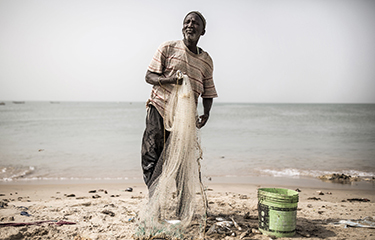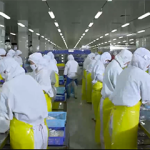EU considers sending border agency to help patrol Senegal’s waters

The European Commission is negotiating with Senegal on a proposal to deploy the European Union border agency, Frontex, in the West African country’s territorial waters to guard against illegal fishing and migrant smuggling.
Non-governmental organizations, including the Environmental Justice Foundation, have warned illegal fishing is ongoing in Senegal, fueled by foreign vessels taking advantage of the region’s high levels of poverty and corruption.
EC Commissioner for Home Affairs Ylva Johansson said deploying Frontex in Senegal could reduce the perilous migrant crossings using the dangerous, open-ocean route from West Africa to the Canary Islands. It could also curtail illegal fishing, which has been linked to vessels from Europe and China, the East African reported.
If Senegal agrees to allow Frontex operations to deploy within its territory, it would be the first time the E.U. border agency would be deployed outside the bloc’s jurisdiction. Currently, Senegal's Directorate for Fisheries Protection and Monitoring plans and coordinates surveillance of its exclusive economic zone.
"This is my offer and I hope that Senegal's government is interested in this unique opportunity," Johansson said on 11 February, 2022.
Senegal's government has not yet publicized its position on the offer. But local fishing groups have long decried IUU fishing, which they say has decimated local fish stocks and forced fishermen to consider migration, sometimes using small fishing boats that they can no longer use to fish commercially.
“Every year, the fishermen are forced to leave their country and put their lives at risk as a result of a deep despair caused by scarcity of the resources they depend on for jobs and food security,” Greenpeace Africa said in a report.
Levels of illegal fishing in West Africa, and particularly in Senegal, Mauritania, and The Gambia, have been exacerbated by an influx of foreign vessels fishing in local waters and a fast-expanding fishmeal and fish oil industry.
“Many of the vessels involved in illegal activities in West Africa are operating under flags of convenience," Global Initiative, an NGO tracking international organized crime, said in a report.
Senegal is a country of nearly 16.7 million people with a per capita seafood consumption rate of 23.9 kilograms annually, and fish accounts for up to 75 percent of the animal protein consumed there. But diminishing returns on catches are forcing fishing communities to “turn their back on their ocean, known to be among the richest in the world," Global Initiative said.
Previous attempts to eliminate illegal fishing in have been hampered by a lack of transparency and information-sharing, the Environmental Justice Foundation said. That lack of transparency prevents the country from being able to “assess the risks and prevent illegally caught fish from profiting unscrupulous operators,” it said.
EJF is currently implementing three-year project – “Reinforcing the fight against illegal, unreported and unregulated fishing in Senegal through improved fisheries governance and transparency” – focused on supporting increased transparency.
The current agreement between Senegal and the E.U. has also been blamed by some NGOs for exacerbating problems in Senegal's fisheries governance. The agreement allows E.U. vessels from Spain and France to fish in Senegalese waters as part of a network of fisheries agreements in West Africa. The agreement is an exclusive arrangement, and it did not involve fishing communities in Senegal – despite there being a legal requirement for their involvement, according to EJF.
“The interests of Senegalese fishing communities are sacrificed for the benefit of fishing industries of European or Chinese origin,” EJF said.
The FAO has attributed some of Senegal’s fishing sector troubles with larger countries exploiting its marine resources.
“Since the world’s leading fishing powers have emptied their own waters, the problem of industrial overfishing is being exported to distant seas,” FAO said.
The campaign to end illegal fishing and rebuild fishery resources to sustainable levels has been complicated by a lack of available data tracking exactly how many fishing vessels are operating in Senegal’s territorial waters, EJF said.
“The best tools we have against this scourge are transparency and information sharing, so that all actors along the supply chain are able to assess the risks and prevent illegally caught fish from profiting unscrupulous operators,” EJF said.
It is estimated that Senegal and other West African countries lose USD 1.3 billion (EUR 1.1 billion) to illegal fishing every year, or around 37 percent of their annual catch. Most of those benefits are flowing to companies in the E.U. and China, the world’s biggest seafood markets, according to EJF.
Photo courtesy of the FAO






Share